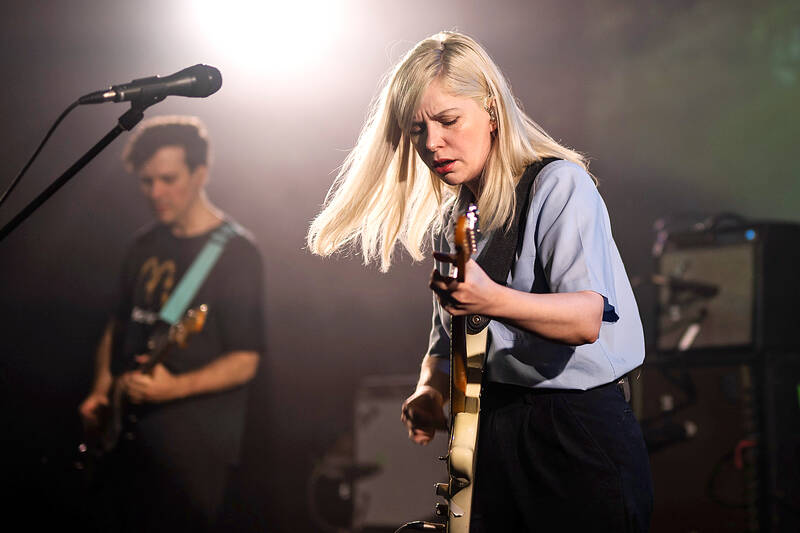In the heart of Taipei at Legacy — a venue renowned for hosting diverse musical acts — Alvvays, a Grammy-nominated ensemble from Canada, delivered a compelling performance last week. With a fusion of indie-dream pop and shoegaze influences, Alvvays enthralled the audience with their catchy, introspective melodies and refined stage presence.
Legacy, brimming with subdued anticipation, served as the ideal setting for Alvvays’ show. Almost reaching its full capacity, the venue buzzed with excitement as the band took the stage. Off Time Production, the local organizers, infused a unique touch by having a hipster pizzeria, Under The Bridge, cater the event. Offering tantalizing NT$100 slices alongside obscure IPAs and Taihu branded beer, their offerings sold out swiftly, adding a distinct flavor to the night.
Alvvays commenced their set with an anthemic rendition of Pharmacist, establishing the mood for an immersive evening. The band’s stage presence blended soothing, delectable, and occasionally ambitious elements especially from guitarist Alec O’Hanley. However, initial bright stage lighting obscured the projected visuals, prompting lead singer Molly Rankin to request dimmer lights for a more enigmatic ambiance.

Photo: Steven Vigar
“It’s a bit hot up here. Can we turn down the lights? We need to create a bit more mystery,” she said during a break between songs.
As the lighting dimmed, the atmosphere shifted seamlessly with their next song, Belinda Says, aligning perfectly with the band’s ethereal tunes.
Interactions with the audience were brief but impactful. Molly’s acknowledgment of this being the band’s inaugural visit to Taiwan garnered the loudest cheers, demonstrating the audience’s familiarity with the band’s journey.

Photo: Steven Vigar
“But it sounds like you know that!” she playfully responded.
Alvvays’ performance replicated their recorded tracks meticulously, highlighting their seasoned expertise and tireless dedication. Each song showcased the band’s exceptional musicianship, resonating magnetically with the crowd.
While maintaining their signature sound, Alvvays surprised the audience by accepting requests for their encore. The crowd eagerly shouted their favorite tracks, culminating in a thrilling rendition of Next of Kin, further solidifying the audience’s connection with the band.
However, the audience’s demeanor was unique compared to Western concert-goers. Reflecting the band’s style, attendees swayed politely, mirroring the dreamy melodies with a thoughtful yet subdued engagement. Molly charmingly acknowledged these differences in Taiwanese audience interaction, a touch that resonated well.
“You guys can get louder, you know! We are used to loud, rowdy North American crowds,” she quipped.
This brief interaction momentarily elevated the crowd’s engagement, enhancing the intimate atmosphere.
Alvvays’ performance in Taipei was a serene journey, enveloping the audience in captivating melodies and refined stage presence. The concert showcased the ensemble’s talent, leaving a lasting impression on a crowd eager to embrace their favorite indie-pop tunes. Alvvays proved to be stalwarts of indie rock, their presence in Taipei reaffirming the city’s dedication to reviving its music scene post-COVID-19 — a reminder of the importance of cherishing and fostering such experiences.

Jacques Poissant’s suffering stopped the day he asked his daughter if it would be “cowardly to ask to be helped to die.” The retired Canadian insurance adviser was 93, and “was wasting away” after a long battle with prostate cancer. “He no longer had any zest for life,” Josee Poissant said. Last year her mother made the same choice at 96 when she realized she would not be getting out of hospital. She died surrounded by her children and their partners listening to the music she loved. “She was at peace. She sang until she went to sleep.” Josee Poissant remembers it as a beautiful

For many centuries from the medieval to the early modern era, the island port of Hirado on the northwestern tip of Kyushu in Japan was the epicenter of piracy in East Asia. From bases in Hirado the notorious wokou (倭寇) terrorized Korea and China. They raided coastal towns, carrying off people into slavery and looting everything from grain to porcelain to bells in Buddhist temples. Kyushu itself operated a thriving trade with China in sulfur, a necessary ingredient of the gunpowder that powered militaries from Europe to Japan. Over time Hirado developed into a full service stop for pirates. Booty could

Before the last section of the round-the-island railway was electrified, one old blue train still chugged back and forth between Pingtung County’s Fangliao (枋寮) and Taitung (台東) stations once a day. It was so slow, was so hot (it had no air conditioning) and covered such a short distance, that the low fare still failed to attract many riders. This relic of the past was finally retired when the South Link Line was fully electrified on Dec. 23, 2020. A wave of nostalgia surrounded the termination of the Ordinary Train service, as these train carriages had been in use for decades

Lori Sepich smoked for years and sometimes skipped taking her blood pressure medicine. But she never thought she’d have a heart attack. The possibility “just wasn’t registering with me,” said the 64-year-old from Memphis, Tennessee, who suffered two of them 13 years apart. She’s far from alone. More than 60 million women in the US live with cardiovascular disease, which includes heart disease as well as stroke, heart failure and atrial fibrillation. And despite the myth that heart attacks mostly strike men, women are vulnerable too. Overall in the US, 1 in 5 women dies of cardiovascular disease each year, 37,000 of them